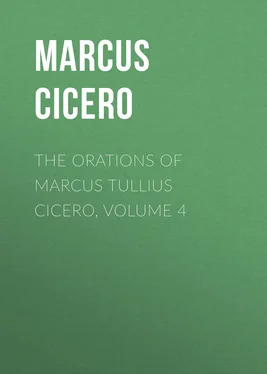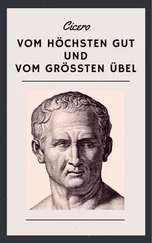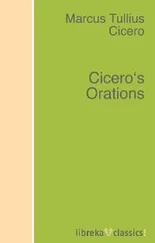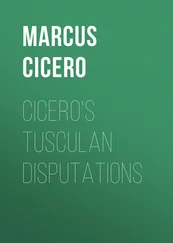Marcus Cicero - The Orations of Marcus Tullius Cicero, Volume 4
Здесь есть возможность читать онлайн «Marcus Cicero - The Orations of Marcus Tullius Cicero, Volume 4» — ознакомительный отрывок электронной книги совершенно бесплатно, а после прочтения отрывка купить полную версию. В некоторых случаях можно слушать аудио, скачать через торрент в формате fb2 и присутствует краткое содержание. Жанр: foreign_antique, Философия, foreign_edu, на английском языке. Описание произведения, (предисловие) а так же отзывы посетителей доступны на портале библиотеки ЛибКат.
- Название:The Orations of Marcus Tullius Cicero, Volume 4
- Автор:
- Жанр:
- Год:неизвестен
- ISBN:нет данных
- Рейтинг книги:3 / 5. Голосов: 1
-
Избранное:Добавить в избранное
- Отзывы:
-
Ваша оценка:
- 60
- 1
- 2
- 3
- 4
- 5
The Orations of Marcus Tullius Cicero, Volume 4: краткое содержание, описание и аннотация
Предлагаем к чтению аннотацию, описание, краткое содержание или предисловие (зависит от того, что написал сам автор книги «The Orations of Marcus Tullius Cicero, Volume 4»). Если вы не нашли необходимую информацию о книге — напишите в комментариях, мы постараемся отыскать её.
The Orations of Marcus Tullius Cicero, Volume 4 — читать онлайн ознакомительный отрывок
Ниже представлен текст книги, разбитый по страницам. Система сохранения места последней прочитанной страницы, позволяет с удобством читать онлайн бесплатно книгу «The Orations of Marcus Tullius Cicero, Volume 4», без необходимости каждый раз заново искать на чём Вы остановились. Поставьте закладку, и сможете в любой момент перейти на страницу, на которой закончили чтение.
Интервал:
Закладка:
XI. You and your colleague, O Dolabella, ought not, indeed, to be angry with me for speaking in defence of the republic. Although I do not think that you yourself will be; I know your willingness to listen to reason. They say that your colleague, in this fortune of his, which he himself thinks so good, but which would seem to me more favourable if (not to use any harsh language) he were to imitate the example set him by the consulship of his grandfathers and of his uncle,—they say that he has been exceedingly offended. And I see what a formidable thing it is to have the same man angry with me and also armed; especially at a time when men can use their swords with such impunity. But I will propose a condition which I myself think reasonable, and which I do not imagine Marcus Antonius will reject. If I have said anything insulting against his way of life or against his morals, I will not object to his being my bitterest enemy. But if I have maintained the same habits that I have already adopted in the republic,—that is, if I have spoken my opinions concerning the affairs of the republic with freedom,—in the first place, I beg that he will not be angry with me for that; but, in the next place, if I cannot obtain my first request, I beg at least that he will show his anger only as he legitimately may show it to a fellow-citizen.
Let him employ arms, if it is necessary, as he says it is, for his own defence: only let not those arms injure those men who have declared their honest sentiments in the affairs of the republic. Now, what can be more reasonable than this demand? But if, as has been said to me by some of his intimate friends, every speech which is at all contrary to his inclination is violently offensive to him, even if there be no insult in it whatever; then we will bear with the natural disposition of our friend. But those men, at the same time, say to me, "You will not have the same licence granted to you who are the adversary of Caesar as might be claimed by Piso his father-in-law." And then they warn me of something which I must guard against; and certainly, the excuse which sickness supplies me with, for not coming to the senate, will not be a more valid one than that which is furnished by death.
XII. But, in the name of the immortal gods! for while I look upon you, O Dolabella, who are most dear to me, it is impossible for me to keep silence respecting the error into which you are both falling; for I believe that you, being both men of high birth, entertaining lofty views, have been eager to acquire, not money, as some too credulous people suspect, a thing which has at all times been scorned by every honourable and illustrious man, nor power procured by violence and authority such as never ought to be endured by the Roman people, but the affection of your fellow-citizens, and glory. But glory is praise for deeds which have been done, and the fame earned by great services to the republic; which is approved of by the testimony borne in its favour, not only by every virtuous man, but also by the multitude. I would tell you, O Dolabella, what the fruit of good actions is, if I did not see that you have already learnt it by experience beyond all other men.
What day can you recollect in your whole life, as ever having beamed on you with a more joyful light than the one on which, having purified the forum, having routed the throng of wicked men, having inflicted due punishment on the ringleaders in wickedness, and having delivered the city from conflagration and from fear of massacre, you returned to your house? What order of society, what class of people, what rank of nobles even was there who did not then show their zeal in praising and congratulating you? Even I, too, because men thought that you had been acting by my advice in those transactions, received the thanks and congratulations of good men in your name. Remember, I pray you, O Dolabella, the unanimity displayed on that day in the theatre, when every one, forgetful of the causes on account of which they had been previously offended with you, showed that in consequence of your recent service they had banished all recollection of their former indignation. Could you, O Dolabella, (it is with great concern that I speak,)—could you, I say, forfeit this dignity with equanimity?
XIII. And you, O Marcus Antonius, (I address myself to you, though in your absence,) do you not prefer that day on which the senate was assembled in the temple of Tellus, to all those months during which some who differ greatly in opinion from me think that you have been happy? What a noble speech was that of yours about unanimity! From what apprehensions were the veterans, and from what anxiety was the whole state relieved by you on that occasion! when, having laid aside your enmity against him, you on that day first consented that your present colleague should be your colleague, forgetting that the auspices had been announced by yourself as augur of the Roman people; and when your little son was sent by you to the Capitol to be a hostage for peace. On what day was the senate ever more joyful than on that day? or when was the Roman people more delighted? which had never met in greater numbers in any assembly whatever. Then, at last, we did appear to have been really delivered by brave men, because, as they had willed it to be, peace was following liberty On the next day, on the day after that, on the third day, and on all the following days, you went on without intermission giving every day, as it were, some fresh present to the republic, but the greatest of all presents was that, when you abolished the name of the dictatorship. This was in effect branding the name of the dead Caesar with everlasting ignominy, and it was your doing,—yours, I say. For as, on account of the wickedness of one Marcus Manlius, by a resolution of the Manlian family it is unlawful that any patrician should be called Manlius, so you, on account of the hatred excited by one dictator, have utterly abolished the name of dictator.
When you had done these mighty exploits for the safety of the republic, did you repent of your fortune, or of the dignity and renown and glory which you had acquired? Whence then is this sudden change? I cannot be induced to suspect that you have been caught by the desire of acquiring money; every one may say what he pleases, but we are not bound to believe such a thing; for I never saw anything sordid or anything mean in you. Although a man's intimate friends do sometimes corrupt his natural disposition, still I know your firmness; and I only wish that, as you avoid that fault, you had been able also to escape all suspicion of it.
XIV. What I am more afraid of is lest, being ignorant of the true path to glory, you should think it glorious for you to have more power by yourself than all the rest of the people put together, and lest you should prefer being feared by your fellow-citizens to being loved by them. And if you do think so, you are ignorant of the road to glory. For a citizen to be dear to his fellow-citizens, to deserve well of the republic, to be praised, to be respected, to be loved, is glorious; but to be feared, and to be an object of hatred, is odious, detestable; and moreover, pregnant with weakness and decay. And we see that, even in the play, the very man who said,
"What care I though all men should hate my name,
So long as fear accompanies their hate?"
found that it was a mischievous principle to act upon.
I wish, O Antonius, that you could recollect your grand father of whom, however, you have repeatedly heard me speak. Do you think that he would have been willing to deserve even immortality, at the price of being feared in consequence of his licentious use of arms? What he considered life, what he considered prosperity, was the being equal to the rest of the citizens in freedom, and chief of them all in worth. Therefore, to say no more of the prosperity of your grandfather, I should prefer that most bitter day of his death to the domination of Lucius Cinna, by whom he was most barbarously slain.
Читать дальшеИнтервал:
Закладка:
Похожие книги на «The Orations of Marcus Tullius Cicero, Volume 4»
Представляем Вашему вниманию похожие книги на «The Orations of Marcus Tullius Cicero, Volume 4» списком для выбора. Мы отобрали схожую по названию и смыслу литературу в надежде предоставить читателям больше вариантов отыскать новые, интересные, ещё непрочитанные произведения.
Обсуждение, отзывы о книге «The Orations of Marcus Tullius Cicero, Volume 4» и просто собственные мнения читателей. Оставьте ваши комментарии, напишите, что Вы думаете о произведении, его смысле или главных героях. Укажите что конкретно понравилось, а что нет, и почему Вы так считаете.












